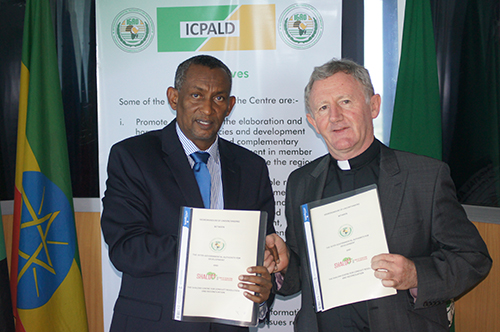 Nairobi, Monday 15 June 2015: IGAD has today signed an updated memorandum of understanding (MoU) with the Shalom Center for Conflict Resolution and Reconciliation.
Nairobi, Monday 15 June 2015: IGAD has today signed an updated memorandum of understanding (MoU) with the Shalom Center for Conflict Resolution and Reconciliation.
At the same time, the two organizations intend to maintain a close institutional relationship for information sharing on ongoing and future activities in areas of common concern and to contribute to the each other’s programme, agenda and strategy development, to the extent possible.
Expressing his gratitude and appreciation to the Shalom Center for accepting to work with IGAD under the expanded MoU, Amb Mahboub Maalim stated that the focus would be conflict early warning and mediation, as well as gender development and research collaboration.
“The peace and security landscape in the region and the world over has drastically changed,” the IGAD Executive Secretary pointed out, adding that the cooperation between the two organizations would therefore be beneficial to the people and governments of the region as they tackle emerging challenges, such as terrorism, migration, radicalization, human trafficking and money laundering.
On his part, Fr. Patrick Devine paid special tribute to the IGAD Secretariat under the leadership of Amb Mahboub for the cooperation that has continued to grow over the years. Appreciating the diversity of people and challenges in the region, the Executive Chairman of the Shalom Center emphasized the need to go beyond stopping violent conflicts undertaking more analysis on the causes and developing post-conflict skills.